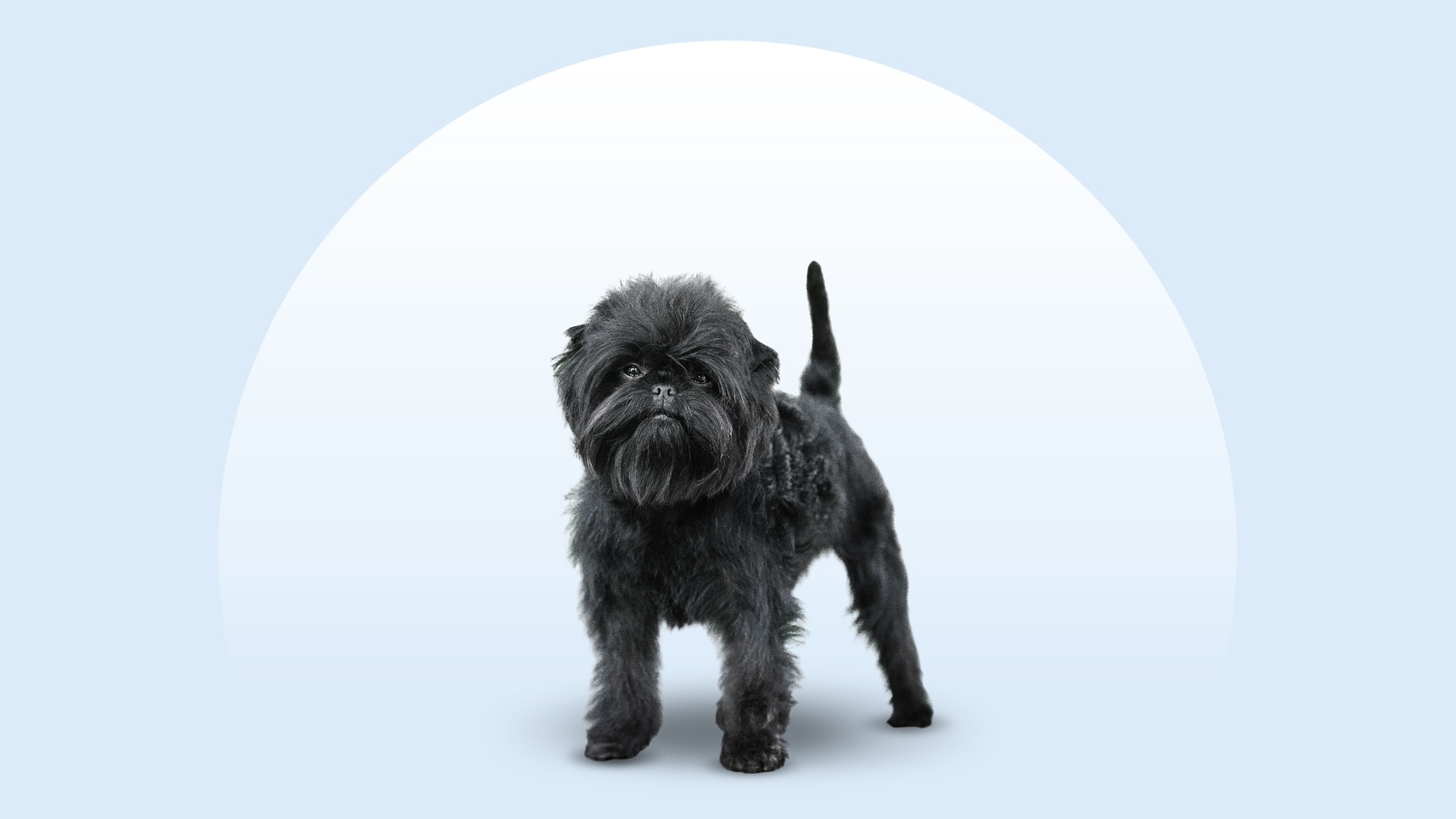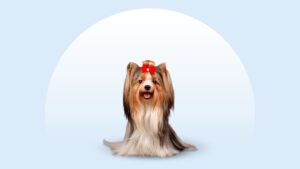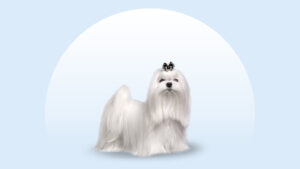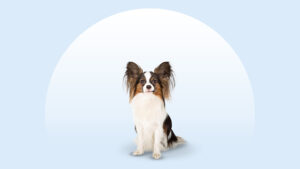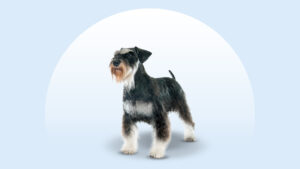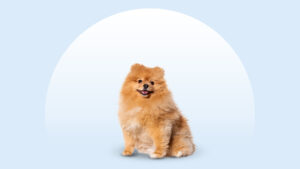Affenpinscher
Updated December 15, 2025
Affenpinscher
Updated December 15, 2025
Curious and confident little dogs, Affenpinschers are best for pet parents who can offer consistent training, positive reinforcement and guidance. These clever, small dogs thrive on attention in homes big or small and do best when their pet parent is around for most of the day.
Inquisitive, Loyal, Spunky
Male: 7-10 pounds
Female: 7-10 pounds
Male: 9-11.5 inches
Female: 9-11.5 inches
12 to 15 years
Black, Black and Tan, Black and Silver, Red, Belge
Admit it: You’ve always wanted your own personal Ewok. Well, the Affenpinscher is a dog in Ewok clothing. Dubbed “monkey terriers” and “mustachioed little devils,” Affenpinschers are curious, have the confidence of a dog 10-times their size and are hilarious. Up for equal parts side-splitting laughter and exasperation? Grab a front-row seat to this breed’s proud comedic antics and sneaky escape artist tendencies. Of course, raising an Affenpinscher offers more than entertainment. Affenpinscher dogs are trusty, loving sidekicks as long as you return the favor with attentive companionship. Whether you’re working from home or heading into a dog-friendly co-working space, your Affenpinscher wants nothing more than to be with you every step of the way.
Affenpinscher Characteristics
Affenpinscher Appearance
Your Affenpinscher dog may be small in size, but they make up for it in confidence. With their bright eyes, smooshy faces, alert gaze and a wiry, bristling coat, these brachycephalic dogs may make “Star Wars” fans do a double-take, as these small pups really do resemble Ewoks. Their wiry coats range from black to beige, but they also come in ruddy browns and salt-and-pepper blends.

- Ears
An Affenpinscher's small, pointed ears can be perky, relaxed or dropped slightly to each side.
- Eyes
They have dark, black-rimmed eyes.
- Nose
Affenpinschers typically have a short, blunt muzzle with a black nose.
- Coat Length
Affenpinschers have longer hair on the head and neck and shorter hair that's more rough-coated along the back and legs. When groomed properly, the hair on their ears should be very short.
- Coat Color
They come in five coat colors: black, black and tan, black and silver, red and belge (which has black, brown and/or white hairs mixed with red).
- Tail
The AKC breed standard allows for their tail to be docked (less than two inches long) and upright or natural and gently curved. Docking involves cutting a portion of the dog’s tail off when they are puppies. Veterinary groups along with many US states and countries have banned this procedure due to medical and behavioral reasons. If you are interested in this procedure, schedule a consultation with your veterinarian.
Affenpinscher Temperament
Has your curious personality ever led people to think you’re nosy? Affenpinschers know how you feel. The Affenpinscher is an incredibly curious and clever breed. Pair that with their playfulness and you’ve got a seriously entertaining dog on your hands. From walking on their back legs to dexterously grappling with toys and balls, your Affenpinscher’s antics will bring energy and joy to your home.
But Affenpinschers also have something of a Napoleon complex: a classic “big dog in a small body.” While they’re fearless and deeply loyal, pet parents would be wise to think carefully before pairing an Affenpinscher with little kids. The dog’s quick, explosive movements might scare little ones, and toddlers’ rough play might irritate or frighten the dog, triggering a barking spree. So, it’s important to not only supervise play with children but also socialize and train dogs and teach children how to properly interact with dogs.
Less bouncy than Pomeranians but more energetic than lap dogs, Affenpinschers could be trained to excel as a therapy dog, an office dog or a loyal sidekick for teens and adults.
How to Care for a Affenpinscher
The Affenpinscher breed may be small, but their maintenance needs are not. Like human toddlers, Affenpinschers need pet parents to provide frequent physical care, positive reinforcement (aka rewards like treats, toys and praise for good behavior) and stimulation for their busy minds. The good news is that the Affenpinscher’s size means they can thrive even in the tiniest of homes!
Grooming
Training
Diet
Exercise
Environment
Affenpinscher Health
Affenpinschers have a lifespan of 12-15 years. They are generally hardy dogs, but they do have a few health issues to watch out for. Knowing the health problems this breed is at risk for can help you keep your Affenpinscher healthy for a long time.
- Patellar Luxation: This common issue in toy breeds occurs when the dog’s kneecap pops out of place, resulting in a limp. Your vet can screen for this issue with a standard patella evaluation. If patellar luxation occurs in your Affenpinscher, ask your vet if your dog needs surgery to correct the problem.
- Heart Disease: Affens are susceptible to a few heart diseases such as patent ductus arteriosus (PDA) and mitral valve disease. PDA is a congenital heart defect that occurs when an arterial shunt doesn’t close after birth and may be treated with surgery. Mitral valve disease occurs when the mitral valve weakens and doesn’t close properly. Treatments may include prescription medications and potentially a prescription diet, like Hill’s or Royal Canin. Make sure your breed has your puppy examined by a vet and, better yet, has a health certificate to screen for murmurs or other congenital abnormalities. If you’re concerned about possible heart anomalies, talk to your vet.
- Vision Problems: Affenpinschers can develop eye problems such as glaucoma (pressure that eventually damages the optic nerve) and cataracts (gradual clouding of vision). Affenpinschers are also more likely than other dogs to have progressive retinal atrophy (PRA), a genetic eye disease. Breeders should screen Affenpinscher puppies for PRA. If you think your puppy or adult dog has developed a new eye issue, talk to a veterinary ophthalmologist about treatment options, which could include medicine or surgery.
- Breathing Troubles: Affenpinschers are brachycephalic and can overheat and have trouble breathing when temperatures soar. (Brachycephalic pups have shortened airways that give them their distinctive squishy faces.) This is easily prevented by carefully monitoring your dog on summer days. Stick to the shade, keep water handy, and stop activity immediately if the dog seems to be struggling to pant.
Affenpinscher History
The Affenpinscher origin story begins in 17th century Germany, when these tiny working dogs were bred to kill mice and rats. But whether by Affenpinscher intelligence or pure cuteness overload, they made their way indoors and into the hearts and homes of their parents.
As Affenpinschers joined the ranks of European house pets, various Affenpinscher clubs formed in France and Germany. The American Kennel Club welcomed them as an official breed in 1936, shortly before World War II. The war detracted from the breed’s popularity for some time, but Affenpinschers’ qualities of cuteness, playfulness and loyalty helped them make a comeback in recent years.
Here’s a fun Affenpinscher fact: In 2013, an Affenpinscher named Banana Joe made breed history by snagging the Best in Show award at the Westminster Kennel Club Dog Show. Since then, Affenpinscher popularity has skyrocketed.
Thinking of adding an Affenpinscher to your home? Generally, you can expect an Affenpinscher puppy to cost between $650-$2,000 for a pup who’s been screened for health and temperament issues. Check out the AKC’s website to find a reputable breeder. If you plan to buy an Affenpinscher puppy from a breeder, prepare a list of questions about the dog’s health, personality traits and any training (housebreaking, for instance) that has been provided. You can also seek out local Affenpinscher rescues to find a loving dog to adopt or keep an eye out for the breed at your local animal shelter. You can also search Chewy’s database of adoptable dogs in your area.
FAQs
Do Affenpinschers shed?
How do you pronounce Affenpinscher?
What are the most common Affenpinscher mixes?
What does Affenpinscher mean?
Are Affenpinschers smart dogs?
Do Affenpinschers bark a lot?
Expert input provided by Dr. Amanda Williams, DVM, a veterinarian at Furry Friends Adoption, Clinic & Ranch in Jupiter, Florida; and Emilea Byrum, KPA-CTP, RVT, owner and head trainer at Maggie’s Foundation: Pet Training in Indianapolis, Indiana.
Breed characteristic ratings provided by veterinarian Dr. Sarah J. Wooten, DVM, CVJ, a veterinarian at Sheep Draw Veterinary Hospital in Greeley, Colorado; dog trainer and behavior consultant Irith Bloom, CPDT-KSA, CBCC-KA, CDBC, owner of The Sophisticated Dog, LLC, in Los Angeles; and certified animal behavior consultant Amy Shojai, CABC, in Sherman, Texas.
The health content was medically reviewed by Chewy vets.
